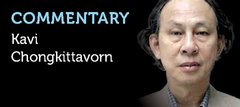
The second Trump-Kim summit in Hanoi failed to produce an outcome that would enable regional partners to play a bigger role. Last week's meeting was strictly a leader-to-leader negotiation, nobody else. US President Donald Trump walked away from the tête-à-tête without an agreement with North Korean leader Kim Jong-un, simply because he thought it was a bad deal to end sanctions at this crucial moment. It is a chicken-and-egg situation.
Mr Trump wants Mr Kim to commit to a comprehensive plan for denuclearisation of his vast arsenal before he flags the end of sanctions. On the other hand, Mr Kim wants the total lifting of sanctions at this juncture. Later, North Korea said it demanded just a partial lifting of sanctions, which have impacted people's livelihoods. Whatever it was -- a misunderstanding or a miscommunication -- the fact remains that the two sides did not strike a deal.

Kavi Chongkittavorn is a veteran journalist on regional affairs.
In the two years since Mr Trump ascended to the presidency, Washington has pressed all countries to fully abide by UN resolutions, 11 in all, to force Pyongyang to accept Mr Trump's demands for no nukes and an end to the production of intercontinental missiles. Before the Hanoi summit, he peppered his pre-negotiation rhetoric with promises to turn North Korea into an economic powerhouse of the world. During the first day of the summit, when Mr Trump repeated this point in front of the global media, Mr Kim looked at him and grinned, puffing up his cheeks. At this juncture, the two sides are standing firm on their respective positions. Doubtless, more meetings and dialogue are needed to work out the future steps that would lead to a more secure Korean Peninsula without the threat of nuclear weapons.
It is intriguing that international media has not paid much attention to the prospective role of Asean. Obviously, having Vietnam as the second venue after Singapore, rendered a strong signal that Asean could play a facilitating role in Korean Peninsula affairs. Although Mr Trump and Mr Kim have not agreed on further talks, Asean must continue to engage North Korea in ways that would not jeopardise efforts by the US, China, Japan and South Korea. All parties directly or indirectly involved in the current diplomatic blitz have a common objective -- to see Pyongyang stop testing and producing nuclear and chemical weapons.
After his meeting with Mr Trump, Mr Kim made a two-day official visit to Vietnam. It was a gesture that he was comfortable with the host, and that their future ties would be a pillar in Pyongyang's approach to Asean. During the decades of sanctions before Mr Kim's rise to power, Vietnam was considered Pyongyang's best friend after Beijing. Indeed, Hanoi has relied on its liberal economic policies to win over the West, especially the US, which has attracted huge foreign investment from all over the world. Vietnam's political system remains unchanged and has provided the stable environment that investors want.
For more than two decades, South Korea has been trying hard to encourage Asean to take a strong position against North Korea's nuclear tests and intercontinental missile development. Since 2006, Asean has been responding to North Korea's nuclear tests with concern and immediate calls for the denuclearisation of the Korean Peninsula. These statements were aimed at showing solidarity with South Korea, the grouping's key dialogue partner. Asean's position and calls have become more significant after Mr Trump and Mr Kim held summits in two Asean capitals, which served to strengthen the confidence and trust between them.
However, one fact that has not sunk in among all Asean leaders is that North Korea's intermediate missile, the Taepodong, has a range of 3,000-5,000 kilometres, meaning it could reach all Asean countries. Given Pyongyang's continued cordial ties with most Asean countries, they do not see these medium-range intercontinental missiles posing any direct threats to the grouping's security. Money laundering, human and weapons smuggling and other transnational crimes have been high on the bilateral agenda with North Korea.
Of late, South Korea, under the leadership of President Moon Jae-in, has given Asean more breathing space to use its style of diplomacy to hold dialogue and engage with Pyongyang via various Asean-led mechanisms. Since these activities are not prohibited under the UN-sponsored resolutions, for instance, Asean should further urge North Korea to take an active role in inter-sessional activities at the Asean Regional Forum. At the end of November, when the South Korean and Asean leaders are scheduled to meet in South Korea to commemorate the 30th anniversary of their relations, both sides are expected to further discuss what they can do to bring North Korea into the regional scheme of affairs.
At the moment, North Korea has limited engagements with the region both in terms of official and non-official tracks -- the so-called "track two network". For two decades, the annual Asia Pacific Round Table, organised by the Kuala Lumpur-based Institute of Strategic and International Studies, has invited delegates from Pyongyang to attend.
Pyongyang is also a member of the Council for Security Cooperation in the Asia Pacific (CSCAP). But when North Korean officials showed up for some of these meetings, they were mobbed by the international media. At the CSCAP Chiang Mai meeting in 2017, the North Korean delegates refused to come out of their hotel rooms.
In the months ahead, Asean's role will certainly increase, but in discrete ways. Asean's position on denuclearisation and the inter-Korean trajectory is clear, as it supports the ongoing dialogue between the US and North Korea, as well as the ongoing inter-Korean dialogue. Asean also supports the joint statement issued last June between Mr Trump and Mr Kim. This is buttressed by the Panmunjom Declaration and the Pyongyang Joint Declaration that Mr Kim and Mr Moon adopted last year.
